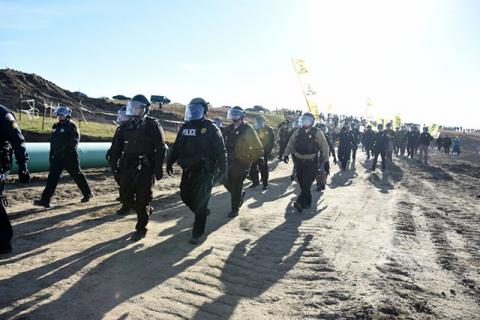That history requires us both to understand climate change as powered in great measure by the pursuit of policies and practices done to people of color, and to see our radically altered global atmosphere itself as part of the felt experience of people of color, and of continued repression and exploitation.
Like the racist policing we witnessed at the Dakota Access pipeline (and have been witnessing throughout the nation), climate change was, as feminist philosopher Chris J. Cuomo reminds us, "manufactured in a crucible of inequality." Specifically, it is "a product of the industrial and the fossil-fuel eras, historical forces powered by exploitation, colonialism and nearly limitless instrumental use of 'nature.'"
In other words, the processes by which the colonial powers created their wealth and warmed the planet were, as legal scholar Carmen G. Gonzalez notes, inextricable from the oppressive practices they used to both transform the "subsistence economies" of the Global South "into economic satellites of Europe," and to dominate and exploit people of color around the globe.
Though we live now in a postcolonial world, it is nevertheless true, as Leonardo Helland and Tim Lindgren argue, that "long-standing patterns and forms of power" continue to be "reproduced throughout the world as an ongoing consequence of colonization." After all, the "structures" that were "put in place" over the course of "450 years did not evaporate with ... decolonization." We "continue to live under the 'colonial power matrix,'" to which the repressive policing of people of color and the extraction of fossil fuels -- often done hand-in-hand -- are as crucial as they were before decolonization. In this regard, climate change continues to be manufactured in a crucible of inequality -- though the production of our altered climate is something in which most of us the world over are complicit -- and our carbon-saturated atmosphere continues to bear the marks of repression and exploitation.
We could say that the colonial power matrix is literally in the air.
Indeed, it was in the air when G4S -- the private security team hired by Dakota Access, LLC -- set its dogs on the Standing Rock Sioux as they resisted the construction of the Dakota Access pipeline on their land because the pipeline will contaminate their drinking water, destroy or harm sacred sites, and ultimately contribute to climate change. It was in the air when machine gun-wielding and riot-outfitted local police descended upon, maced, clubbed, arrested and strip-searched pipeline protesters. And it was in the air during the military checkpoints conducted by the National Guard deployed outside of the Standing Rock Sioux reservation.
In fact, the radically altered atmosphere in which the pipeline struggle has been taking place is actually a thing that Dakota Access LLC's private security and the state are literally defending on behalf of people who -- in the tradition of colonial settlers of the past -- believe they are entitled to disregard at will Indigenous rights as well as treaty obligations. For it is not the mere construction of a pipeline that these security forces hope to safeguard for Dakota Access LLC and other corporate interests. It is, more critically, the actual burning or release of fossil fuels and thus the manufacture of a chemically altered atmosphere -- because therein lies the profit.
The pipeline project actually requires the exploitation of Native lands (as opposed to land occupied primarily by whites), the repression of the Sioux, the fouling of natural resources and, finally, the burning or release of fossil fuels. Ultimately, the Dakota Access pipeline is a project in which rising global temperatures are the necessary end result.
"Climate change" cannot contain any longer the history of exploitation that produced our radically altered atmosphere and the politics of domination that continue to produce it.
In fact, "climate change" must become a promise to speak everywhere and all the time of our altered climate -- and even our "extreme weather events" -- in terms that conjure (for example) conquest, colonialism, settlers, genocide, apartheid, reservations, indentured servitude, rape, Bantustans, Jim Crow, racial segregation, annexation, partition, national liberation, neocolonialism, Western-propped dictatorships, proxy wars, neoliberalism, policing, regime change and treaty violations.
Ultimately, however, "climate change" must be a commitment to undertake a radical politics of decoloniality -- to dismantle the murderous, nihilistic colonial power matrix against which the Sioux are courageously fighting and which is assailing Indigenous communities wherever fossil fuel exists, all the while driving millions of life forms to extinction.
Copyright, Truthout. May not be reprinted without permission. Reprinted with permission.
Alycee Lane is author of Nonviolence Now! Living the 1963 Birmingham Campaign's Promise of Peace (Lantern Books, 2015). Follow her on Twitter: @AlyceeLane.


Spread the word